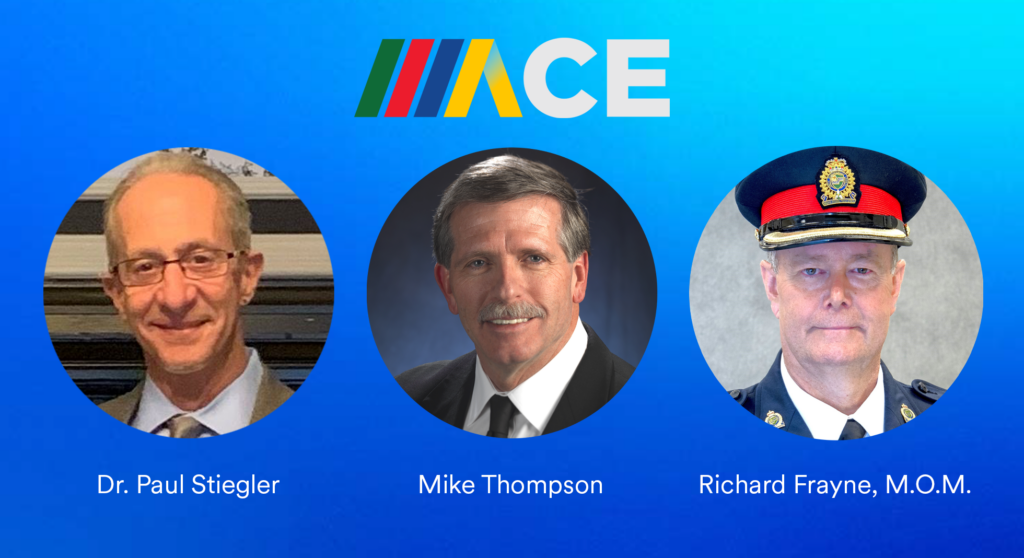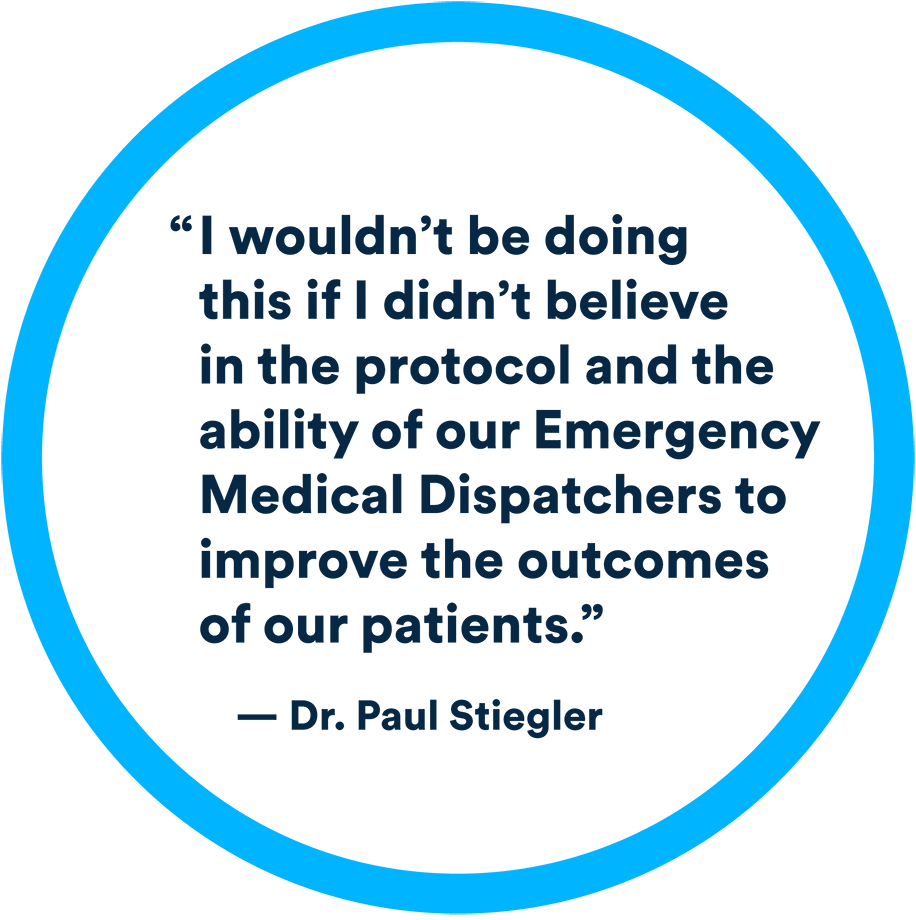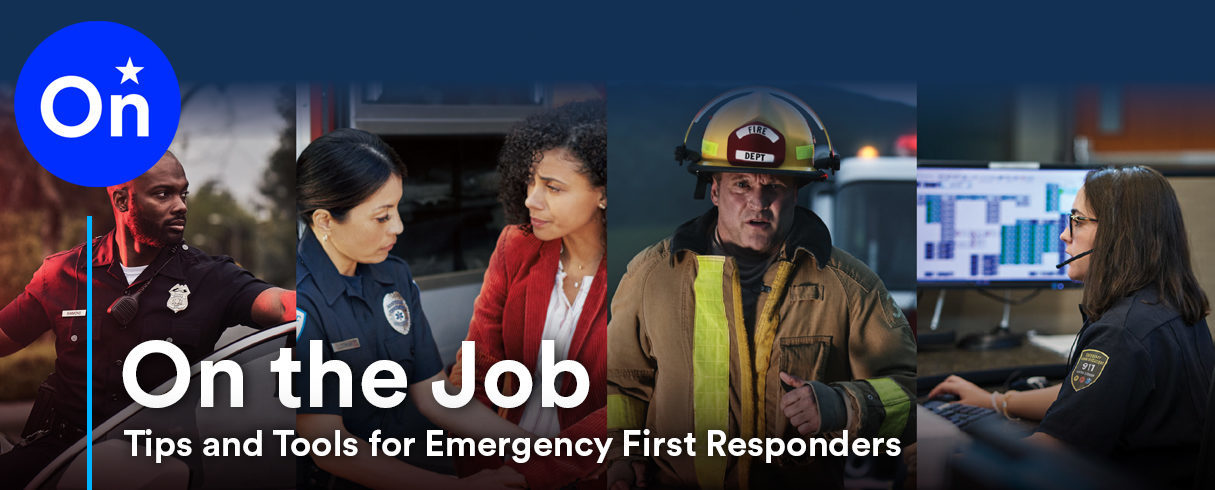
General Motors’ OnStar has become the first nongovernment entity to be honored with the Triple-Accredited Center of Excellence (Tri-ACE) status by the International Academies of Emergency Dispatch (IAED)®. OnStar has completed a rigorous and measurable set of globally recognized best practices for emergency medical, fire and police emergencies. Behind the scenes, OnStar Emergency Advisors have the support and guidance of a trio of professionals experienced in public safety to help them become the best of the best.
The OnStar Emergency Directors — Dr. Paul Stiegler (Medical), Mike Thompson (Fire) and Richard Frayne (Police) — are important resources for the Emergency Advisors, offering guidance in a variety of areas ranging from protocols to accreditation.
Let’s learn a little about each of these directors:
Dr. Paul Stiegler
Dr. Stiegler has been involved in emergency medicine since 1979, shortly after it became a board-certified specialty. A graduate of the University of Minnesota Medical School, he is boarded in Emergency and Family Medicine, held directorships at all levels of EMS and 911 Emergency Communication, and is a consultant for the IAED.
Since 2010, Dr. Stiegler has been the Emergency Medical Director for OnStar and is responsible for helping Advisors understand why protocols are important and why they’re in place. “The EMD program is scripted and works well, but to be a good emergency call processor, you should really know the medical reasoning behind it,” he says. “My job is to help them be situationally aware of what’s happening while they are asking all these scripted questions.”

Dr. Stiegler also interacts with local EMS to assure them OnStar Advisors are trained at the same level as 911 professionals in the area of emergency call processing. “They need to know we are doing EMD at the highest level, and when we give them an Acuity Code, they can trust it — and trust that our Members are receiving the proper instructions for bleeding or chest pains, or even if they just need an aspirin. This is why accreditation is so important.”
To make sure Advisors are prepared for accreditation, Dr. Stiegler looks at the results of a variety of data compiled by the Quality Assurance Team to see whether it makes sense and whether there are any outliers. “Mostly, I’m here to teach and help them ask the right questions to get the most accurate information,” he says. “I wouldn’t be doing this if I didn’t believe in the protocol and the ability of our Emergency Medical Dispatchers to improve the outcomes of our patients.”
Mike Thompson
Mike Thompson is a retired Fire Service Battalion Chief with 27 years of experience. He is a subject matter expert with IAED and has taught certification courses and provided consulting services for public-safety agencies across the United States and abroad. Thompson also has held certifications in multiple Fire and EMS disciplines throughout his public-safety career.
“My background is as an operations person who’s very concerned with what happens in the field,” he says. “It starts with the communication center; information gathered by OnStar is intelligence that’s being developed, and that helps a First Response agency be ready with the proper resources. You can’t operate by thinking that we’ll deal with whatever it is when we get there.”
To help develop Advisors’ knowledge and help fire agencies get the information that they need, Thompson will have sessions to review Pre-Arrival Instruction (PAI) calls to see what might be causing concerns. This, in turn, could lead to the development of new policies. A recent analysis of flood-water calls helped shape recommended guidelines for considering what is life-threatening versus what vehicles just need roadside assistance. “Not every call can be handled the same; they don’t all fit in a nice, neat box,” Thompson says. “We like to see what comes in and ask whether we can adjust training policies to allow us to manage calls like that more efficiently in the future.”
In his work with OnStar, Thompson has been surprised by the type of calls that OnStar receives. “I was not aware Members used OnStar to that extent,” says Thompson. “Realizing what information these Advisors have in terms of real-time intelligence, I’d advise any PSAP to listen to them … it could save someone’s life.”
Richard Frayne, M.O.M.
Richard Frayne is a retired Police Superintendent from Canada who served in a variety of roles in law enforcement. (M.O.M. stands for Member of the Order of Merit of the Police Forces.) In his 37-year career as a frontline law enforcement responder and, in particular, as an Emergency Task Unit Commander, Richard Frayne lives by the motto, “Shaving seconds saves time; getting information saves lives.”

“I have always been a person who is intelligence-driven when responding to situations,” he says “The more information I have, the better decisions I make. My interest in emergency dispatch is born from the need for good information gathered from our callers.” As Frayne was promoted through the police department, he was tasked with overhauling his dispatch center’s call processing — he adopted the same structured call-taking system that OnStar Advisors use.
Frayne sees himself as a link between OnStar Advisors and First Responders. “OnStar Advisors are not police officers, and don’t physically respond to a collision, impaired driver or a domestic dispute,” he says. “I give a face to the First Responders they’re getting information for, so they better understand the value they bring to these situations. Conversely, most First Responders have not been emergency dispatchers, and don’t understand the vital role Advisors play.”
In establishing protocols for Advisors, Frayne calls on his experience and knowledge of numerous areas in policing, combining theoretical concepts and practical real-world experiences. But Frayne says these protocols, along with those from IAED used by OnStar, do not work by themselves — they need a formidable team of professionals to implement them. “Our Advisors exemplify professional and dedicated call-taking,” he notes. “I have seen 50-plus PSAPS across North America and OnStar is right at the top.”
Frayne admits that prior to being involved with OnStar, he associated it more with roadside assistance and stolen-vehicle assistance. But once he joined the team, he was surprised by the types of calls the Advisors take and their intensity. “I recently listened to two medical calls that involved CPR being delivered; one to a patient by his distraught wife, and the second by a grandmother pleading for help for her 7-year-old granddaughter,” Frayne says. “In both cases, our Advisors remained calm and compassionate professionals.”
OnStar is proud to have earned Tri-ACE and to continue being a support tool for public safety. If your agency has any questions about our call-handling and triage process, please contact us by email at emergencyservices@onstar.com.

